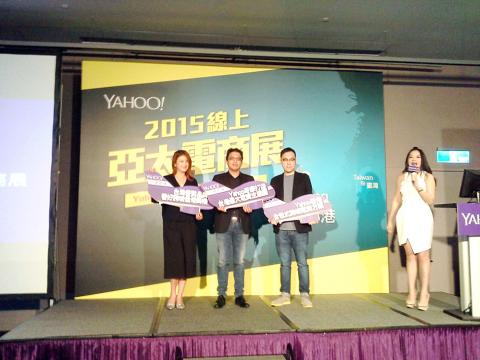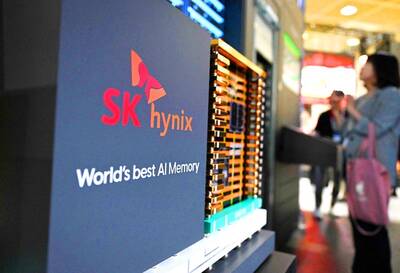Yahoo Taiwan Holding Ltd (雅虎) yesterday launched a Taiwan-Hong Kong e-commerce shopping platform, inviting about 1,000 online stores from Taiwan to explore business opportunities of cross-border online shopping.
“The cross-border platform can be successful as Hong Kong has tariff exemption for imports and the consumers there are very interested in Taiwan’s food and cosmetics,” Yahoo Taiwan’s e-commerce group vice president Jacky Wang (王志仁) told a news conference at the eCommerce Expo Asia in the Taipei World Trade Center’s Nangang Exhibition Hall.
Citing international research results, Wang said that the global business-to-consumer cross-border e-commerce market is expected to jump from last year’s US$230 billion to US$1 trillion by 2020.

Photo: Lee Ching-hui, Taipei Times
“The next five years are going to be very important for Yahoo Taiwan to seize the opportunities in cross-border e-commerce,” he said.
Hong Kong is the most suitable market for Taiwan’s online stores moving into the cross-border e-commerce industry, because the territory shares similar cultural and linguistic backgrounds with Taiwan, Wang said.
Taiwan is ranked one of the top five overseas markets for Hong Kong consumers making purchases through online shopping platforms, Wang said, citing company data.
The average monthly salary of a Hong Kong online shopper is NT$110,000 (US$3,340), 2.6 times higher than the Taiwanese average of NT$42,000, which means they have relatively high purchasing power, Wang said.
Yahoo Taiwan is working with Yahoo Hong Kong to offer advertising exposure to Taiwanese online stores during the upcoming 11.11 shopping festival, Wang said.
Singles’ Day (光棍節) on Nov. 11 was reportedly begun by male Chinese university students, who called it Bachelors’ Day, but as its popularity spread it was embraced by both men and women and the name was changed.
Taiwanese shops could station themselves in Hong Kong’s Yahoo Flagship free-of-charge, Wang said, adding that the platform also offers stores complete logistics solutions.
“Yahoo’s services would lower the entry threshold of cross-border e-commerce for the online shops, helping Taiwanese companies enter the international market,” he said.
Taiwan’s e-commerce penetration rate is among the top three in the world, which shows the nation has been successful in developing the business model for retail transactions, the Taiwan Internet and E-Commerce Association (TiEA, 台灣網路暨電子商務產業發展協會) said.
At the expo’s opening ceremony, TiEA chairman Jan Hung-tze (詹宏志) said that e-commerce now accounts for more than 11 percent of Taiwan’s total retail revenue, trailing behind South Korea and the UK, but ahead of the US and China.
While Taiwan lacks large-sized e-commerce operators — defined as those that have market capitalization surpassing US$1 billion — the nation’s nearest small and medium-sized corporate participants have helped the sector grow rapidly, said Jan, who is chairman of PChome Online Inc (網路家庭), a leading Taiwanese e-commerce operator.
The Institute for Information Industry (資策會) has forecast that the local retail e-commerce would earn US$33.4 billion in revenue this year.
Additional reporting by CNA

Intel Corp chief executive officer Lip-Bu Tan (陳立武) is expected to meet with Taiwanese suppliers next month in conjunction with the opening of the Computex Taipei trade show, supply chain sources said on Monday. The visit, the first for Tan to Taiwan since assuming his new post last month, would be aimed at enhancing Intel’s ties with suppliers in Taiwan as he attempts to help turn around the struggling US chipmaker, the sources said. Tan is to hold a banquet to celebrate Intel’s 40-year presence in Taiwan before Computex opens on May 20 and invite dozens of Taiwanese suppliers to exchange views

Application-specific integrated circuit designer Faraday Technology Corp (智原) yesterday said that although revenue this quarter would decline 30 percent from last quarter, it retained its full-year forecast of revenue growth of 100 percent. The company attributed the quarterly drop to a slowdown in customers’ production of chips using Faraday’s advanced packaging technology. The company is still confident about its revenue growth this year, given its strong “design-win” — or the projects it won to help customers design their chips, Faraday president Steve Wang (王國雍) told an online earnings conference. “The design-win this year is better than we expected. We believe we will win

Power supply and electronic components maker Delta Electronics Inc (台達電) yesterday said it plans to ship its new 1 megawatt charging systems for electric trucks and buses in the first half of next year at the earliest. The new charging piles, which deliver up to 1 megawatt of charging power, are designed for heavy-duty electric vehicles, and support a maximum current of 1,500 amperes and output of 1,250 volts, Delta said in a news release. “If everything goes smoothly, we could begin shipping those new charging systems as early as in the first half of next year,” a company official said. The new

SK Hynix Inc warned of increased volatility in the second half of this year despite resilient demand for artificial intelligence (AI) memory chips from big tech providers, reflecting the uncertainty surrounding US tariffs. The company reported a better-than-projected 158 percent jump in March-quarter operating income, propelled in part by stockpiling ahead of US President Donald Trump’s tariffs. SK Hynix stuck with a forecast for a doubling in demand for the high-bandwidth memory (HBM) essential to Nvidia Corp’s AI accelerators, which in turn drive giant data centers built by the likes of Microsoft Corp and Amazon.com Inc. That SK Hynix is maintaining its